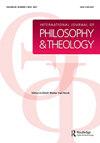产生不可能:克里马库《哲学片段》中的神学与解构
IF 0.3
0 PHILOSOPHY
International Journal of Philosophy and Theology
Pub Date : 2021-03-15
DOI:10.1080/21692327.2021.1923557
引用次数: 0
摘要
摘要:根据罗杰·普尔(Roger Poole)的观点,Søren Kierkegaard的间接沟通的神学阐释者优先于形式的内容,而解构阐释者则优先于内容的形式。在这里,我阅读了约翰内斯·克里马库斯的《哲学碎片》,以说明在这种情况下,神学/解构主义和形式/内容二元体系是如何崩溃的。《碎片》的形式既是神学的,也是解构的:克里马库斯对圣经的万花筒般的引用和他的抛物线比喻都证明了这一点。同样,《碎片》的内容与神学一样具有解构性:名字的推迟、决定时刻的疯狂,以及克里马库斯对矛盾的使用,都让任何天真的神学感到不安。最终,我认为,《碎片》之所以抵制形式/内容和神学/解构主义的二元对立,是因为它是一部关于化身的文本——形式和内容的典范性结合,是一个矛盾的现实,打破了神学和解构主义之间的任何分歧。本文章由计算机程序翻译,如有差异,请以英文原文为准。
Giving birth to the impossible: theology and deconstruction in Johannes Climacus’s Philosophical Fragments
ABSTRACT According to Roger Poole, theological interpreters of Søren Kierkegaard’s indirect communication privilege content over form, whereas deconstructive interpreters privilege form over content. Here, I offer a reading of Johannes Climacus’s Philosophical Fragments to illustrate how, in this case, the theology/deconstruction and form/content binaries both break down. The form of Fragments is as theological as it is deconstructive: Climacus’s kaleidoscopic quotation of scripture, and his parabolic tropes both attest to this. Similarly, the content of Fragments is as deconstructive as it is theological: the deferral of names, the madness of the moment of decision, and Climacus’s use of contradiction all unsettle any naïve theology. Ultimately, I suggest, the reason that Fragments resists the form/content and theology/deconstruction binaries is because it is a text about the incarnation – a paradigmatic combination of form and content, and a paradoxical reality that bursts apart any division between theology and deconstruction.
求助全文
通过发布文献求助,成功后即可免费获取论文全文。
去求助
来源期刊

International Journal of Philosophy and Theology
PHILOSOPHY-
CiteScore
0.30
自引率
0.00%
发文量
12
期刊介绍:
International Journal of Philosophy and Theology publishes scholarly articles and reviews that concern the intersection between philosophy and theology. It aims to stimulate the creative discussion between various traditions, for example the analytical and the continental traditions. Articles should exhibit high-level scholarship but should be readable for those coming from other philosophical traditions. Fields of interest are: philosophy, especially philosophy of religion, metaphysics, and philosophical ethics, and systematic theology, for example fundamental theology, dogmatic and moral theology. Contributions focusing on the history of these disciplines are also welcome, especially when they are relevant to contemporary discussions.
 求助内容:
求助内容: 应助结果提醒方式:
应助结果提醒方式:


